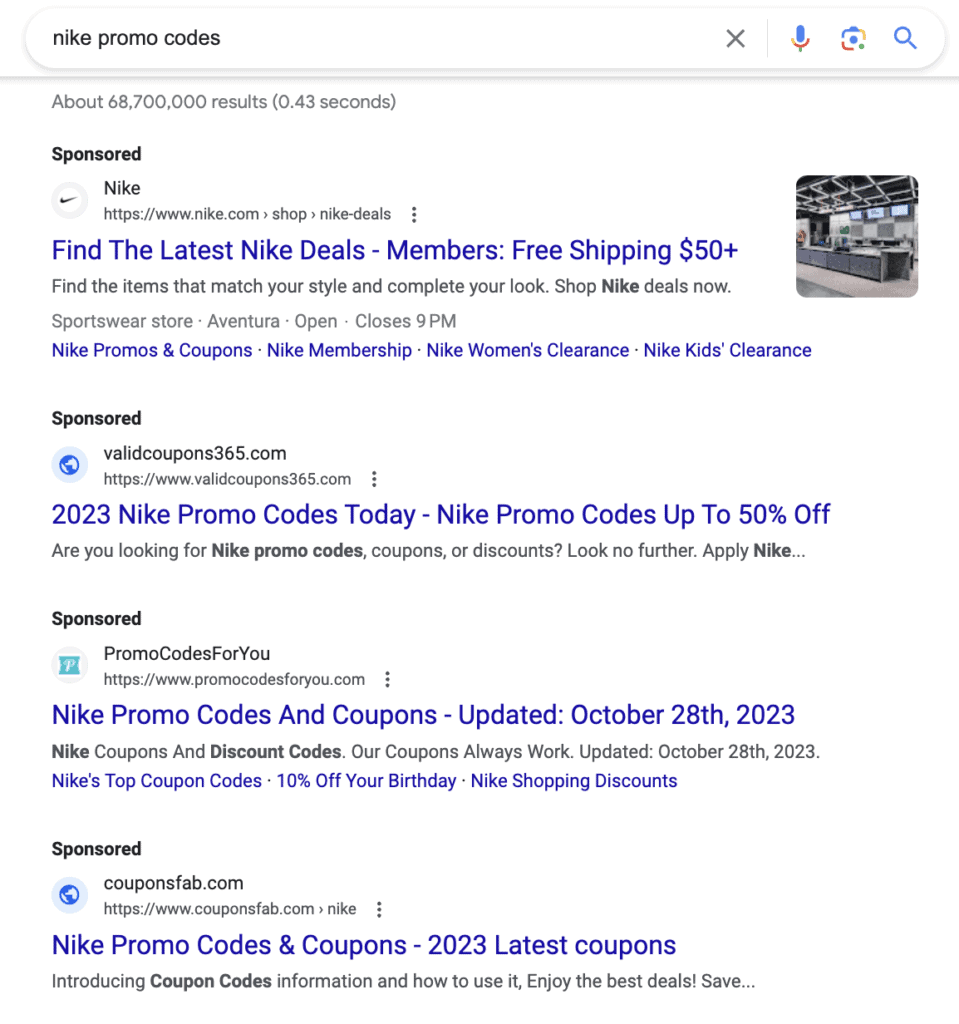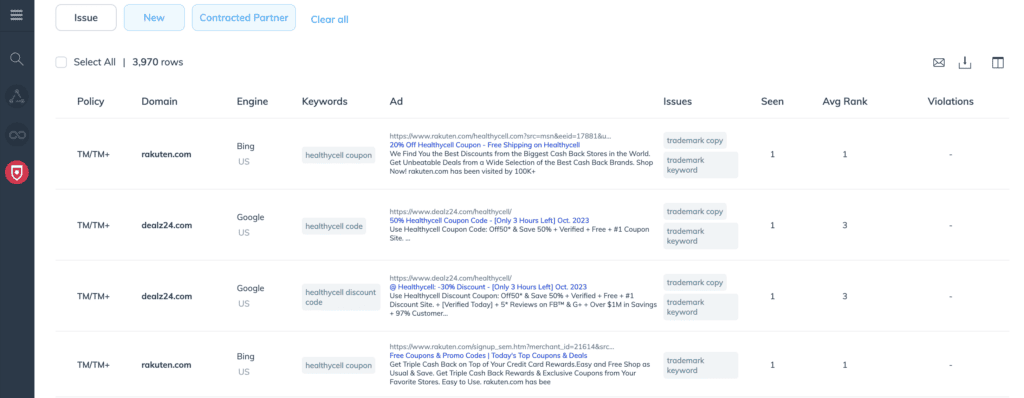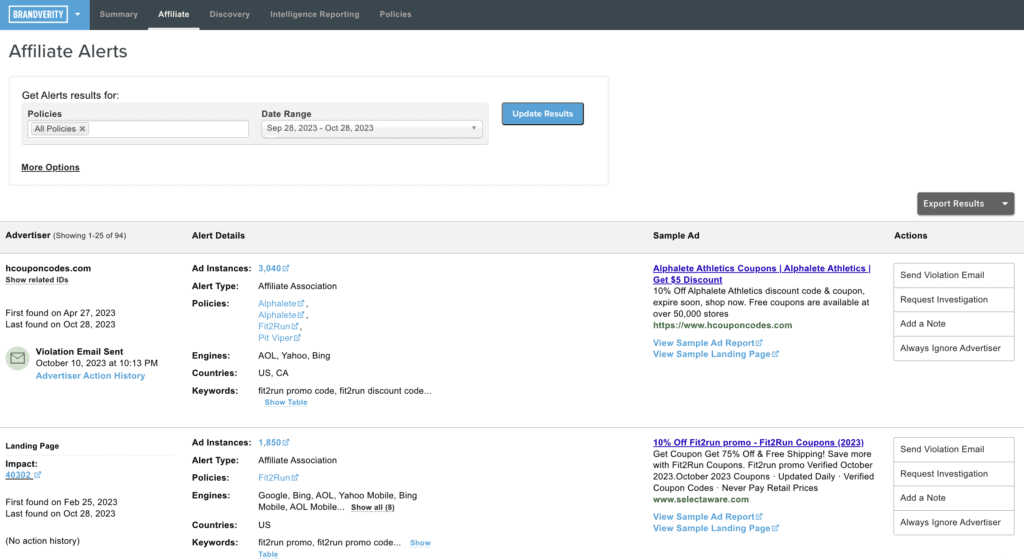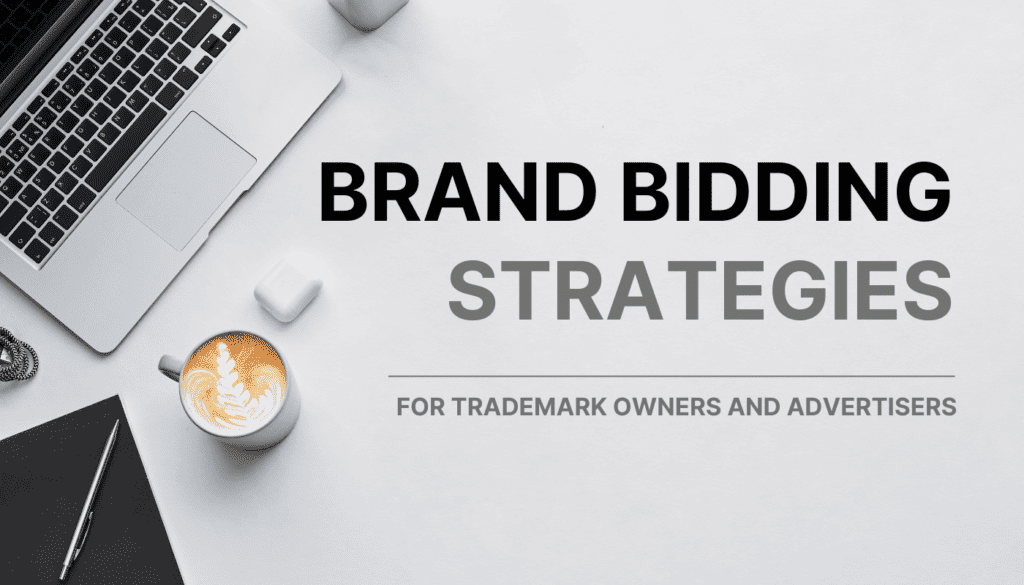What is brand bidding?
Brand bidding – also called trademark bidding – is a search marketing tactic used in online advertising. It involves advertisers strategically bidding on keywords and phrases associated with trademarked brands such as “Apple”, “Adidas”, or “Dyson”.
By extension, trademark plus bidding, in the context of online advertising, is an advanced strategy where advertisers go beyond bidding on exact match branded terms by bidding on a combination of broader trademark keywords or phrases such as “Apple discounts”, “Adidas deals”, or “Dyson promo codes”.
Every year there are at least 190 million clicks (and sales) taken away from brand owners by trademark bidding for the advertisers bidding on the terms to gain better control over the search results and capture a wider audience.
Some advertisers use brand bidding as a strategy to protect their brands by either targeting the competitors’ trademarks or by building strategic partnerships with Search bidders and affiliates to keep control over this practice.
While it can be an effective way to expand visibility, it may also lead to increased competition and costs in the advertising space, making it a more complex but potentially rewarding tactic for marketers.
What are the objectives of trademark bidding?
The objectives of trademark bidding in online advertising typically include:
- Increased visibility in paid search results for relevant trademark keywords to enhance visibility and can lead to a higher click-through rate for the advertiser.
- Capture a broader audience by targeting users searching for their brand as well as specific product or service-related keywords. This can help reach potential customers who may not be aware of the brand but are interested in the offerings.
- Competitive advantage by preventing competitors from exclusively bidding on their brand name and helps protect their brand.
- Control over messaging where advertisers can craft specific ad copy and landing pages tailored to the combination of their brand and relevant keywords.
- Maximize conversions guiding users to pages or offers designed to convert them into customers, potentially increasing conversion rates and ROI.
- Brand protection uses this tactic as a defensive strategy to protect a brand from competitors who may try to bid on its trademark.
- Valuable data insights into user behavior and search trends, which can be used to refine advertising campaigns and improve overall marketing efforts.
What are the types of trademark bidders?
There are 4 most common brand bidders in advertising:
- Brand owners – aka trademark owners – such as online businesses, retailers, and merchants that own the trademarked brand such as Nike, Pepsi, Apple, Samsung, Zara, etc.
- Brand partners such as resellers, retailers, wholesalers, franchisees, or authorized dealers. These bidders usually sell the trademark brand amongst a catalog of other offers and brands. For example, Nike can have many retailer and reseller deals and be listed on online sites such as Foot Locker, Amazon, Finish Line, Nordstrom, etc.
- Direct competitors are other companies – and in this context other Search advertisers – who bid on the brand name or trademark plus terms. For example, Nike’s direct competitors include, Addidas, Reebok, New Balance, Under Armour etc. Direct competitors usually bid on trademark terms and use comparison terms to entice users to click on the ad so they win the traffic.
- Paid Search affiliates bidding on trademark plus terms in compliance with terms and rights given by the brand. These types of affiliates are rewarded for the traffic they send to the brand’s websites and get compensated when a conversion happens. Most common Paid Search affiliate bidders include review sites, coupon sites, cash-back sites, and top niche bloggers. Whereas these bidders get paid on a CPA basis, comparison shopping engines (CSEs) are paid per click on a CPC basis, regardless of whether or not the traffic is converted. Examples of top affiliate partners include Rakuten, Honey By Paypal, CapitalONE Shopping, etc.
Examples of targeted ‘trademark plus’ keywords by advertisers
Trademark plus terms are easily identifiable. Below are common terms bidders target as these terms have high clickthrough and conversion rates potential;
- “Trademark Keyword + coupons”
- “Trademark Keyword + promo codes”
- “Trademark Keyword + discounts”
- “Trademark Keyword + promos”
- “Trademark Keyword + deals”
- etc.
In the example below, when searching for “Nike coupons”, we can see Nike’s own paid listing showing up in POS #1, followed by validcoupons365.com, PromoCodesForYou.com, and Couponsfab.com, which are coupon sites.

As we don’t have much more information about the direct relationship Nike has with these coupon sites, we can assume that Nike has worked on agreed terms, granting trademark plus bidding rights to its top-performing affiliates and trusted publishers as a way to keep control over brand bidding, dominate paid search results to prevent other direct competitors’ to bid on their trademark and therefore minimize CPCs and brand reputation.

So what’s the “real’ deal in investing more time and effort in that tactic?
What are the reasons to allow trademark bidding?
Brand owners can use trademark bidding tactics to support goals such as:
- Increase net profit or top-of-funnel activities brand awareness
- Use the tactic to support a SERP domination strategy
- Drive up the cost of entry for their competitors
In affiliate marketing, many trusted loyalty and cash-back site partners use trademark plus bidding – in agreement with the brand owners – to increase new-to-file customers, increase brand reach and visibility, and help their brand partners combat a competitor to enter a paid result listing for targeted trademark terms.
Because trademark bidding tactics have an immediate impact on brand reputation, impact on ROAS, and cost, it is important to first understand the current Search performance and analyze each Search channel contribution; whether for paid, organic, or affiliate’s performance for the trademark terms.
- If (branded paid traffic revenue – media spend) + organic revenue > organic revenue with no brand ads, brand bidding makes sense.
- If (branded paid traffic revenue – media spend) + organic revenue < organic revenue with no brand ads, brand bidding does not make sense.
(Credits for these great “if/then”formulas to the Search Engine Journal’s SWAT team!)
What is the impact of brand bidding on trademark owners?
- Increased advertising costs as the trademark owner may have to bid against competitors for their branded keywords and pay more for each of the clicks as paid search prices are set through an automated auction.
- Cannibalization of organic traffic that may divert users who would have found the trademark owner’s website through organic search results to paid ads, potentially reducing the effectiveness of organic traffic.
- Confusion for users when they see multiple ads for the same brand, potentially leading to a less clear and consistent brand image.
- Limited control over competitors bidding on the branded keywords.
How do search engines control trademark bidding?
Search engines like Google control trademark bidding through a combination of policies, guidelines, and tools that outline how advertisers can bid on trademarks. These policies often allow the trademark owner to request that their trademark not be bid on by other advertisers.
Search engines also provide a complaint process that allows trademark owners to report violations of their trademark rights. When a valid complaint is received, search engines may restrict or disallow the use of the trademark in ads by other advertisers.
Another way to partner search engines help prevent trademark violation is that they may require advertisers to undergo a trademark validation process to prove that they have the right to use the trademark in their ads.
If unauthorized bidders make it to this point, the other way for search engines to regulate the practice is during the ad approvals and review; search engines typically review ads to ensure they comply with trademark policies. Ads that violate these policies may be disapproved or removed.
Search engines respect the rights of trademark owners and may grant them more control over who can bid on their trademarks and often provide educational resources to inform both trademark owners and advertisers about their trademark policies and how to enforce or comply with them.
Adherence to these policies and guidelines is crucial for advertisers to avoid penalties and maintain a positive online advertising experience.
For more information about trademark policies, you can refer to:
How to prevent brand bidding in Affiliate Marketing and protect your Paid Search campaigns?
Preventing trademark bidding in affiliate marketing requires time, attention, and investment in the right compliance monitoring tool solution.
For some brands already using the affiliate model, it is an advanced affiliate strategy to leverage to protect the brand, search shares, and cost optimization, preventing unauthorized use of your trademark by affiliates.
For other brands, net new to affiliate marketing, this can be a way to explore the affiliate marketing model and access more branding control, cost optimization levers, and measurable ROI when going to market.
If you work in a performance marketing department in-house or an agency, it is important for the Search and Affiliate Partnership teams to closely collaborate on brand bidding strategies and compliance models in an integrated manner;
- Regularly audit your affiliate program to identify potential risks or opportunities to leverage trademark plus bidding strategies with your partners.
- Clearly outline trademark bidding policies in your affiliate program terms and conditions. Specify which affiliates are allowed or not to bid on your trademark or use it in ad copy, including in search engine advertising. List all the keywords out of reach for paid search affiliate bidders.
- Educate affiliates about your trademark policies and the importance of compliance through comprehensive guidelines and training. Ensure they understand the consequences of trademark bidding violations.
- Ensure to adjust your own paid search branded bidding strategy and campaigns and add TM+ terms to negative keyword lists to protect your CPCs, if TM bidding rights are being granted to affiliate partners and specific search bidders.
- Monitor affiliate and partners’ activity including how they go to market online and promote the brand on Search via their ad campaigns and keyword usage.
- Monitor paid ad campaign traffic and keyword usage by checking any increases in CPCs or decreases in CTRs that can indicate an advertiser is bidding to outrank your paid listings and win over the traffic.
- Maintain open communication with your affiliates to regularly remind them of your trademark policies and the importance of adhering to them to protect the brand’s integrity.
- Get automated paid search compliance and monitoring solutions for more thorough control either through the affiliate network the program is set up or using other third-party solutions.
What if you manage a portfolio of thousands of affiliate partners?
Best tools to monitor trademark bidding
There are tools and solutions in the market to help you control and monitor paid search and trademark bidding violations 24/7 through automated processes and crawling technologies.
Impact and BrandVerity are amongst the best-paid search monitoring and trademark plus bidding compliance tools, affiliate, and paid search managers can add to their toolset to best prevent unauthorized bidders.
These tools are quite complete as they will provide information about infringing ads, ad copy, destination URL, and landing pages that were targeting trademark keywords.




Trademark bidding and monitoring tools can help marketers recapture click volume, misattributed sales and recover thousands of dollars to re-invest in paid media or other channel initatives.
In most cases, affiliate managers are usually part of the functional team responsible for monitoring trademark plus bidding activity, setting up targeted keywords to monitor within the platform, and based on the contracts and terms set with affiliates.
They should be accountable for managing the workflows, communicating with the global performance marketing team about violations, and checking overall search performance.
Wrapping-up
Brand Bidding strategy and trademark plus bidding should be STRATEGIC regardless of what stage of your project you operate, what function, or what size of the business you have a stake in.
With the overall rise in ad prices and the decline in effectiveness amidst heightened competition, it is essential to understand how, when, and why to use trademark bidding and trademark bidding plus strategies to keep a competitive edge online while optimizing your spend and protecting your brand reputation.
If brand owners have diversified their media mix using affiliate marketing relationships to drive down cost, increase ROAS, and expand their reach, there is a way to set up clear outlines and terms of use with these partners to either restrict or grant exclusive trademark rights.
Preventing trademark bidding in affiliate marketing requires a proactive approach that combines clear policies, education, monitoring, and enforcement.
By implementing these strategies, you can reduce the risk of trademark abuse by affiliates and safeguard your brand’s reputation.
Have you run some searches for branded terms and trademark plus terms lately? If, so what’s showing up in the results? You’d be surprised!
Your Success Starts With The Good Strategy!












